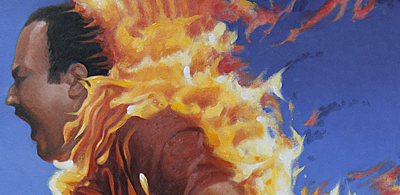Architect Philip Johnson – RIP
Pioneering American architect Philip Johnson died on Tuesday, January 25th, 2005, he was 98 years old. His controversial designs encompassed everything from magnificent corporate headquarters to the Crystal Cathedral in Los Angeles.
Johnson coined the architectural term international style and invented the role of museum architecture curator at New York’s Museum of Modern Art (MOMA) in 1931. Terrence Riley, the current chief curator for architecture at MOMA, said that Johnson “literally changed the landscape of American architecture.” The US press has lavished praise upon Johnson, calling him “architecture’s greatest presence” and “Dean of US architecture.”
All of this and more is certainly true. But the press tributes have ignored one lingering fact – Philip Johnson was an admirer of Adolf Hitler.
Johnson spent the early 30’s in Germany, and in ’32 attended a Nazi rally in Potsdam where he saw Hitler deliver an address. It was love at first sight and the young Johnson became an ardent fascist. Returning to the US, he aligned himself with the fanatical anti-Semite priest, Father Coughlin. When Johnson again revisited Germany in the late 30’s, it was as a foreign correspondent for Coughlin’s pro-Nazi magazine, Social Justice. Johnson attended one of the Nuremberg rallies, and when the war broke out, he was writing anti-British diatribes for Coughlin’s magazine. Trailing the Nazi troops who invaded Poland, Johnson wrote:
“The German green uniforms made the place look gay and happy. There were not many Jews to be seen. We saw Warsaw burn and Modlin being burned. It was a stirring spectacle.”
Social Justice regularly published articles denouncing the “Jew controlled Roosevelt” and the “Jews of Wall Street.” The magazine was eventually barred from the mail by the US government for violation of the Espionage Act. When Johnson arrived back in the states, he suffered no adverse consequences for his pro-Nazi sympathies, and he was accepted everywhere as his career in architecture truly began to blossom.
Johnson’s past was largely forgotten or ignored by the press, and he kept silent about his love for Hitler until his last day, when he excused himself by saying, “I lost my mind.”
In celebrating the achievements of Philip Johnson, we should also acknowledge his flaws. Frank Gehry, one of today’s prominent US architects (and also of the Jewish faith), put it this way, “We forgave, but we didn’t forget.”


